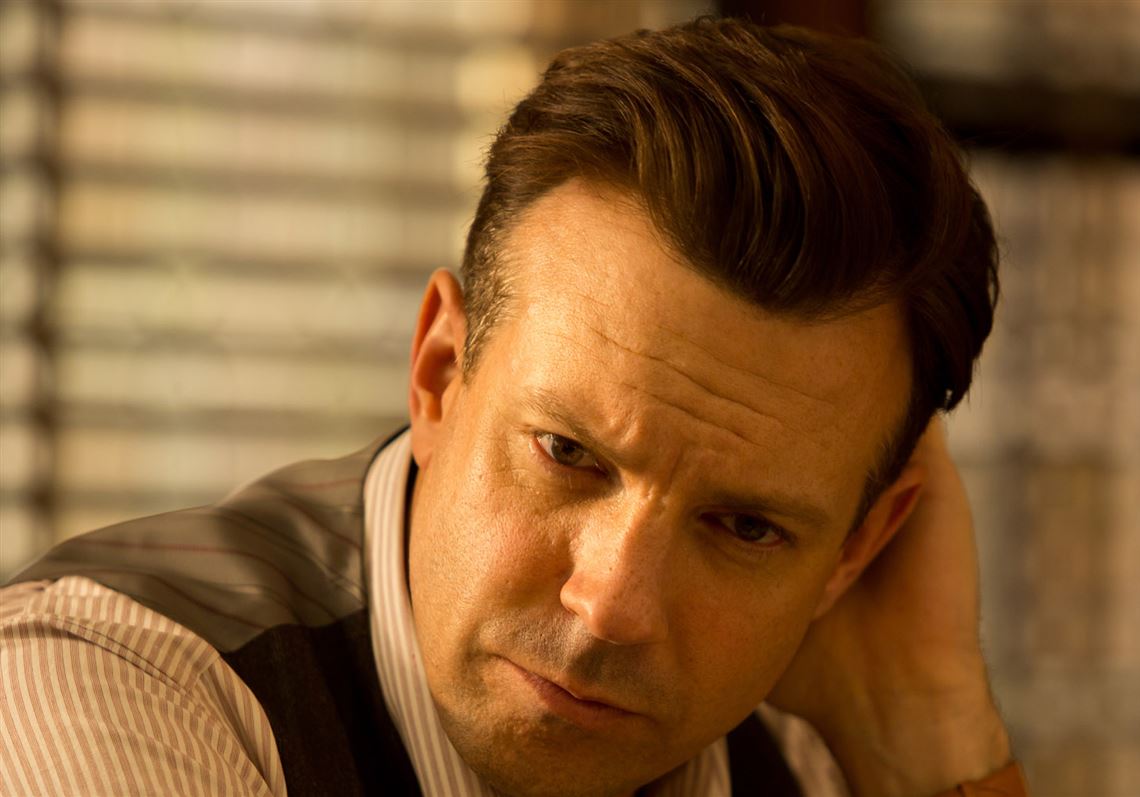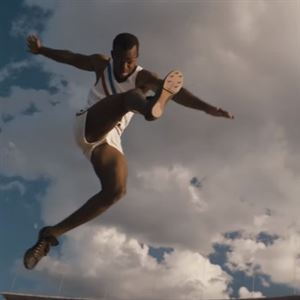Right athletic competition. Wrong decade, trailblazer, number of gold medals and ability to crush Hitler's ugly myth of Aryan supremacy.
When actor Jason Sudeikis told people he was making "Race" about Jesse Owens, some confused the four-time gold medalist from the 1936 Olympics in Germany with one of the Americans who gave the black power salute at the '68 Mexico City Games.
"Oh, no, no, no," Mr. Sudeikis would correct. "Jesse Owens. It's like the Jackie Robinson story except on the global stage and against the ultimate personification of evil -- Hitler," he recounted in a recent phone call from Los Angeles.
"Race," opening in theaters Friday (in some theaters tonight), stars the Toronto-born Stephan James (John Lewis in "Selma," Terrance "T.K." Kelly in "When the Game Stands Tall") as Mr. Owens. It zeroes in on the years 1934-36.
Mr. Sudeikis is Larry Snyder, the Ohio State University coach who became mentor and lifelong friend to the track and field superstar who won gold in the 100-meter dash, 200-meter dash, broad jump and 400-meter relay in Berlin.
Jeremy Irons plays Avery Brundage and William Hurt is Jeremiah Mahoney; the men locked horns over whether the United States should boycott the competition as a protest against Hitler. Carice van Houten portrays filmmaker Leni Riefenstahl, and Shanice Banton is Ruth Solomon, Jesse's childhood sweetheart turned wife.
Although brief biographies of Mr. Snyder can be found online, not a great deal is known about him. The Canton, Ohio, native (1896-1982) graduated from OSU and returned there to take over the track and field program.
His athletes set 14 world records, won 52 All-American certificates and eight Olympic gold medals, according to the USA Track and Field Hall of Fame. An assistant coach of the 1952 Olympic team, Mr. Snyder was head coach of the 1960 team. He retired from coaching five years later.
"There's not much info out there. In this day and age when we all have a library on our laptops, we still couldn't find much. It was two photos and an appearance on 'This Is Your Life' with Jesse," Mr. Sudeikis said.
"But there's just not a lot, which I was OK with, coming from the background of 'SNL' and doing impersonations and having to play someone that people were so aware of, it would have been a different gig for me. I don't know if I would h ave attacked it any differently if we did have a bunch of information. Stephan was really the one saddled with playing the icon; I was just playing a man in support of that story."
Director Stephen Hopkins shared a telling quote about Mr. Snyder from Mr. Owens' autobiography.
"He referred to Larry as an 'accidental non-racist.' I just thought that was a very interesting, clever and complicated description that made total sense to me and was clear even through the draft of the script. ... That being from Jesse's point of view, a man that he met when he was 22 and remained close friends with the rest of his life, that meant a lot."
The production filmed in and around Montreal but also in Berlin at the Olympiastadion, constructed for the 1936 event and the arena where Mr. Owens earned his medals.
"We rebuilt Hitler's box that had been, for an attempt at a silly joke, circumcised from the stadium," he said. Alarmed tourists and others asked, "What is going on? Why is that being built again?"
As for swastikas that add historical accuracy, Mr. Sudeikis said, "They have very, very strict rules in Germany about them, giant fines for the existence of them. You can feel their embarrassment and sorrow for that being part of their fairly recent history."
The Fuhrer appears as a chilling figurehead, always conveniently absent when it came time to greet an African-American winner. Joseph Goebbels, played by actor Barnaby Metschurat, is a full-fledged character who spars with Riefenstahl and is shown trying to bribe or pressure Brundage with the contract to build the German embassy in Washington, D.C.
"I thought that actor did a great job. You can still feel the evil, but it's coming from Darth Vader and not the Emperor," Mr. Sudeikis said, dipping into the "Star Wars" universe for his reference.
Although many movies about coaches and athletes present them as father figures and sons, that wasn't the case with Mr. Snyder. He starts off as coach and, once he earns Mr. Owens' trust and respect, quickly becomes a mentor who raises the prospect of the young black man from Ohio, the son of a sharecropper who worked the cotton and corn fields of Alabama, going to the Olympics.
"Then you see the shift of when Jesse becomes Larry's mentor when he encourages and demands -- dare I say -- Larry to see him as a human being, not just an athlete," he said. Their friendship is forged when, thanks to Mr. Owens' talent and Mr. Snyder's support of that talent, they land at the site of the Americans' Olympic glory.
The PG-13 rated "Race" obviously is more family friendly than his work in the R-rated "We're the Millers," "Horrible Bosses" and its sequel, and the comedic love story "Tumbledown" also starring Rebecca Hall and Joe Manganiello.
Mr. Sudeikis, who grew up in Kansas City as one of three white players on a largely black basketball team, is looking forward to sharing the eventual DVD of "Race" with his and Olivia Wilde's son, Otis, who will be 2 in April. When his fiancee was filming "Love the Coopers" in Pittsburgh, he visited, tapped into the local pinball scene and joined the actress on a visit to a wintry Fallingwater.
On the other side of the family tree, the actor added, "I was excited to do the movie because I knew my dad would love the movie, and he'd love this character." Larry Snyder reminded him of Gene Hackman in "Hoosiers" and a less-bawdy Kevin Costner in "Bull Durham" along with his own father, especially his integrity.
"Race" arrives in the middle of Black History Month and during a protracted, overdue discussion about diversity on the big screen and in the offices where decisions are made.
"This is an independently financed film, it is financed by French people, by Canadian people. It stars a black Canadian and a comedian from Kansas, it's directed by a white British fellow born in Jamaica. It's an international story.
"The third entendre, if I will, of the title, is not just about foot races and black and white, but about the human race," he said. "That's the most important thing the movie has to represent. Things are getting better but we need to keep talking about it."
First Published: February 18, 2016, 5:00 a.m.


















